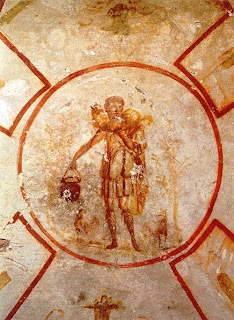 |
| The Good Shepherd mural from the Catacombe of Calistus in Rome (3rd century) Jean and Alexander Heard Library at Vandebilt Divinity School |
Acts 2:42-47
1 Peter 2:19-25
John 10:1-10 Psalm 23
The 4th Sunday in Easter is always “Good Shepherd” Sunday, so called because the appointed Psalm is the 23rd – ‘The Lord is my Shepherd’. In many churches, appropriate “shepherd” hymns (often versions of Psalm 23, in fact) are sung on this Sunday to underline the theme.
In successive years the Gospel passage – always from John’s Gospel – differs slightly, but it never fails to include Jesus’ application of the metaphor of the shepherd to himself. This year we are told that “Jesus used this figure of speech with them, but they did not understand what he was saying to them”. How much harder must it be for us to understand it, since we live in a world that – even in rural areas – is very far removed from the ancient world where the biblical shepherd was a common sight.
Thanks to the enduring popularity of the 23rd Psalm, the language of sheep and shepherd is still familiar and comforting to most church people. Yet, this very familiarity can prevent us from grasping its essential feature. Shepherds in biblical times had two key tasks – to lead the sheep to sources of water that they were unlikely to find themselves, and to protect them from wild animals against which they were powerless. It was the superior strength, wisdom and care of the shepherd that made this possible, and without which the sheep could be expected to “go astray, each to his own way” (Isaiah 56:3).
The message is not an entirely easy one for a modern audience. The contemporary spiritual climate emphasizes seeking, searching, questing and questioning. It is deemed enough to have set out on a spiritual journey of our own. The image of the Good Shepherd runs counter to this. It is God who finds us, not we who find God. Our task is to be able to recognize His call, and then to follow the divine Word as it uniquely comes to us through Christ. The attempt to establish a spiritual path through life of our own devising will only lead to dangerous wandering.
In this year of the Lectionary, the brief passage from Acts gives us a sense of the excitement and urgency with which the first converts heard this call. Two thousand years on there cannot be that same urgency. But the passage also gives us a clear indication of what has lain at the heart of Christian practice, even from the earliest times -- “teaching, fellowship, breaking of bread and prayers".
Thank you for this reflection on the Good Shepherd and the important distinction that "it is God who finds us, not we who find God." As you point out, this is not our contemporary way of doing things! Perhaps our desire for active seeking can be directed inward to discover that receptive humility that we will need to respond to the call.
ReplyDeleteThe works of art that you coordinate with the lessons each week are also greatly appreciated and enhance the contemplation of the readings very much.